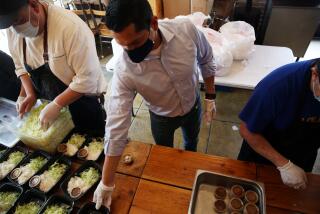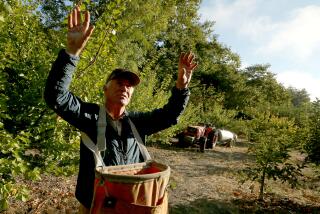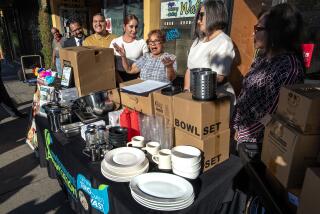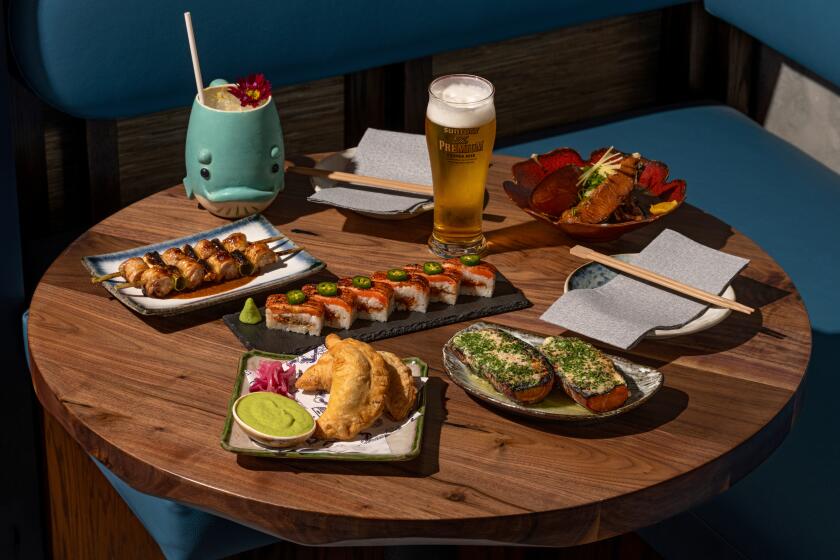Making sure backyard fruit isn’t wasted
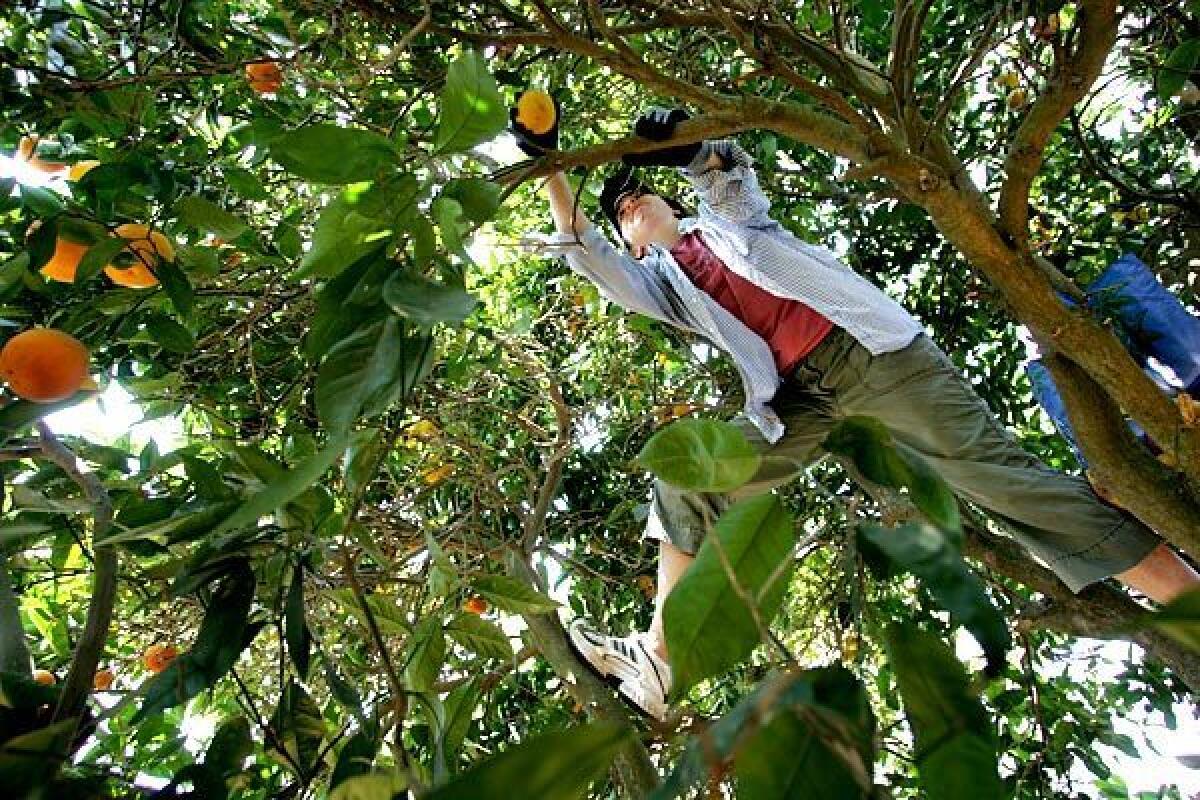
It was on walks with his dog Scout that Rick Nahmias became increasingly troubled by the citrus fruit he saw all around his Valley Glen neighborhood, dropping to the ground, rotting, when so many people were hungry. In Glassell Park Hills, on her walks, Hynden Walch saw food going to waste in her neighbors’ yards, and she began running through ideas for how to use it.
It was the simplest of connections: fresh food that’s free or nearly so, and people to eat it.
Nahmias and Walch, and others like them, are working at an intriguing crossroads: using e-mail, blogs, Facebook and Twitter to foster old-fashioned networks among their neighbors, or among like-minded people looking to make their world a little better. In the process, Walch has built a cooperative in which gardeners share their bounty, an idea that is quickly spreading. Nahmias established a group called Food Forward that has donated nearly 30,000 pounds of citrus fruit to food pantries this year.
“This is like ‘The Little Engine That Could,’ ” says Nahmias, a photographer, filmmaker and writer who has documented the lives of migrant workers. “To my great pleasure and astonishment, this has taken off.”
Nahmias says he had long wanted to gather a group of “food people” to do more than just eat together, and since Barack Obama’s election, he has felt “a real call to service.” Now, volunteers pick most Wednesdays and Sundays, on properties with a few trees to those with a few hundred.
“By placing the fruit in the box next to them, and knowing that box will be unloaded for someone,” volunteers grasp a powerful tie, he says.
Community spirit
And the camaraderie that’s apparent as volunteers work is breaking through to potluck meals and cocktail hours, and friendship, at a time when some of the participants say they feel a sense of disconnection and alienation in their city.
Elizabeth Dell, an independent filmmaker and Food Forward volunteer, says she believes in policy change but appreciates the tangible efforts of harvesting fruit.
“You understand the value of what you’re doing. You just picked 1,200 pounds of fruit. And we all know that within three calendar days that will be in the hands of people all over Los Angeles who really need it.”
Food Forward and Walch’s Hillside Produce Cooperative are just two among many projects trying to make sure that the food growing in California doesn’t go to waste. There’s a “free farm stand” in San Francisco, and gleaners in several cities. The artists behind Fallen Fruit in Los Angeles focus on fruit growing in public spaces.
In Santa Barbara, Jim Roehrig runs a project that has harvested many thousands of pounds of excess fruit for the local food bank. He and Nahmias collaborated on the harvest of 11,000 pounds of oranges and grapefruit in one weekend.
Sometimes, property owners seek out the group. Janette and Larry Williams had heard about Food Forward and called to see if the group would like the oranges and grapefruit from the half-dozen trees in their Encino yard. They had lived in their home for 40 years and raised five children there, and the person who had helped them maintain the trees had died.
So one hot Sunday, volunteer Carl Buratti organized a dozen other Food Forward volunteers in their yard, explaining how to use the fruit pickers -- little baskets on long broomsticks -- reminding them to use sunscreen, getting waivers signed.
“It would have taken me hours to do this. My husband and I are very happy to donate,” Janette Williams says.
It was volunteer Patrick Jensen’s third time out to pick.
“It’s great. It feels so good to know that fruit that would have gone to waste will go into the hands of someone who needs it,” says Jensen, who lives in Hollywood and is studying to be a clinical psychologist.
The Williams’ yard yielded 800 pounds of fruit in about two hours. “It’s not win-win. It’s win to the fourth degree,” Nahmias says.
One, the property owner wins, getting trees cared for -- which reduces the risk of rodents -- and receiving a tax deduction for their donation. Two, the volunteers get to do some good and have fun. Three, the food bank clients get fresh fruit. And four, the food bank gets to spend money on something else. The cost is a little gas and $12.50 wood-and-metal fruit pickers.
Food Forward has been giving fruit to SOVA, run by Jewish Family Services, and to MEND, or Meet Each Need With Dignity, which is based in Pacoima.
“It has been an incredible collaboration,” says Fred Summers, director of operations at SOVA, which is based in Van Nuys. “Literally thousands of people are getting healthy, nutritious produce.”
Neighbors sharing
The Hillside Produce Cooperative started by Walch runs on a model of neighbor feeding neighbor. It also grew fast, from 10 members a year ago to 130 now. And at the August exchange, people also came to learn how to start cooperatives in other neighborhoods.
It works like this: A few days before the monthly exchange, Walch sends an e-mail. Everyone who wants to take part replies. On the designated Saturday morning, they drop off on her steps the fruits and vegetables they have, in bags labeled with their names and addresses.
Walch and a few volunteers tally what’s there and divide it evenly. For the August exchange, 25 bags were made up, with an assortment of herbs, chard, onions, tomatoes, figs, lemons, grapefruit, celery and more. One month, a member made jars of loquat jam.
“It’s not, ‘Well, you only gave this much, so you get this much,’ ” says Walch, an actor. “It’s my chance to live out my ideal of a moneyless system.”
She doesn’t know if she’s feeding people who might not otherwise afford such fresh food; she doesn’t ask. “Mostly I don’t think this is any of my concern,” she says. “It’s: ‘Wow, you have lemons? Welcome.’ ”
As the volunteers worked on a recent weekend, they talked about recipes and gardening. Julie Zafiratos, a TV producer and one of Walch’s friends, says she’s been introduced to new foods through the cooperative, including Thai chiles and sorrel.
Among the volunteers was Jade Maloney, who wants to start a chapter in Mid-City-Koreatown. Within days, she had a website ready, seeking members.
By midafternoon, drivers deliver the bags of food. Members who don’t have anything to contribute that month can volunteer to pack or deliver bags.
After the August exchange, Walch invited everyone to Verdugo Bar to celebrate Hillside Cooperative’s first anniversary. “Some of the people who have lived on the hill for decades got to know each other,” Walch says.
All it took was a few vegetables.
More to Read
Eat your way across L.A.
Get our weekly Tasting Notes newsletter for reviews, news and more.
You may occasionally receive promotional content from the Los Angeles Times.
